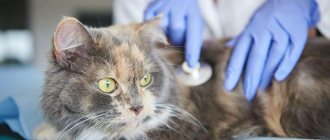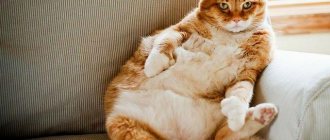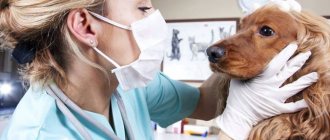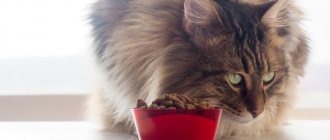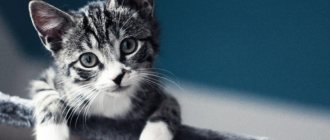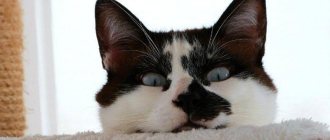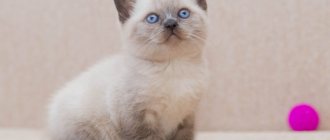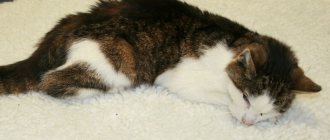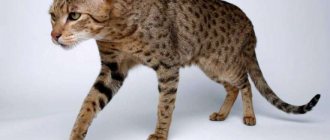Every pet unfortunately ages over time. Over time, the cat cannot properly care for itself, and its metabolism decreases. The owner’s task is to change the conditions of detention and delve into some of the features of caring for an aging animal. The greatest attention should be paid to the quality of nutrition and body weight of the animal.
Any changes in the body negatively affect the condition of the cat’s body and can shorten its lifespan. Excess body weight creates an increased load on the pet’s cardiovascular system, also affecting the organs of the respiratory system and musculoskeletal structures.
Lack of body weight also leads to serious consequences, causing exhaustion of the body. If your cat is not eating well, the cause may be changes in the sensory system. In this regard, secondary changes occur, the sensitivity of taste buds and receptors responsible for smell is weakened.
Hearing loss
Hearing loss does not occur in old age in all cats, but it is very common. If you call your cat several times and she doesn't respond, her hearing may not be as good as it used to be.
There are different degrees of deafness, with some cats having only a slight degree. Other older cats may become completely deaf. If you notice any major changes in your cat's feelings or behavior, you will need to contact your veterinarian to rule out another, more serious health problem.
The same thing happens with loss of vision and smell. The breakdown of your pet's senses will lead to attention deficits, and he may begin to become clumsy in his movements and show changes in his mood, so he may be somewhat irritable.
Doubts become the norm
We all know that with age, people increasingly doubt before making decisions, either life experience does not allow them to do rash things, or they constantly think about whether they have enough strength.
The situation is the same with cats: with an aging pet, owners are increasingly observing his doubts: either the pet no longer quickly jumps onto the table without any doubts, or before jumping off, it will take longer than usual to mark the most favorable place for itself.
Changes in eating habits and weight
As your cat gets older, you will find that she eats less or more slowly than before, and her previous appetite will disappear. This happens because over time the digestive system slows down, which can also cause problems with constipation. As digestion becomes slower and more difficult, your cat may also lose weight. If you notice this sign of aging in your cat, it is necessary to adjust the food portions and make changes to her diet.
On the other hand, because older cats are less active, they can gain weight easily and may even become obese. Physical changes are very relative. The situation can get worse if you don't watch out for these symptoms, as it could also be a symptom of diabetes. A common symptom of diabetes in cats is constant eating throughout the day and constant thirst. If you notice this, consult your veterinarian as soon as possible.
Age at which cats become old
On average, an animal lives from 12 to 15 years. Previously, to determine age, 1 year was considered 7. Later, this algorithm was adjusted. Veterinarians have noticed that there is no linear correspondence. Now the year of a pet’s life, by analogy with a human life, is calculated differently, as the table shows:
| Years of a cat's life | Appropriate for a person's age |
| 1 | 18 |
| 2 | 25 |
| 3 | 30 |
| 4 | 34 |
| 5 | 37 |
| 6 | 40 |
| 7 | 45 |
| 8 | 50 |
| 9 | 54 |
| 10 | 58 |
| 11 | 60 |
| 12 | 62 |
| 13 | 66 |
| 14 | 70 |
| 15 | 75 |
Timely treatment of an animal's ailments will prolong its life.
The bifurcation point is considered to be the age of 7 years, when a still mature cat becomes infertile, provided that it is not sterilized. If you provide adequate care for an old cat, treat illnesses promptly and correctly, then your pet will live to a ripe old age, which by human standards corresponds to 105 years. It is important to notice age-related changes in time, which are characterized by specific symptoms.
Slowness of movements
Is your cat not as restless and active as before? This may be a sign of old age. As cats age, they become lazy: they prefer to sleep all day rather than chase mice.
It will also be more difficult for them to move around and perform activities that they did before. The cat will continue to play, but with less intensity, and will become bored with moving faster. An older cat will move more forcefully and less smoothly, which may indicate that there is a problem with the joints and muscles, especially in the hips and hind legs. These are all typical signs of old age.
Other food
A cat, whose life path is already at the stage of old age, begins to increasingly express dissatisfaction with the food served to it; it needs water at the right temperature (it certainly should not be too cold).
Some pets, as they get older, begin to eat differently, sometimes even giving up food altogether - it’s all about the digestive system, the functioning of which slows down with age. As cats age, they begin to eat more slowly and do not rush for food as actively.
Dental problems
Older cats' teeth weaken with age. They may be more sensitive, and if they have a tendency to drool, this may precipitate problems of gingivitis or herpetic gingivostomatitis, in other words general inflammation of the gums.
Just like humans, some cats may even lose teeth, which interferes with the feeding process. To help your cat, you should replace her regular dry food with a more natural one and consider seeing your veterinarian for a thorough oral hygiene routine. You will notice signs that something is wrong with your cat's teeth when you brush them.
Remember that older cats require more care than older cats and require special attention to their diet and health. This article is for informational purposes only and is not intended to prescribe any veterinary treatment or diagnosis. We invite you to take your pet and visit a veterinarian if they are suffering from any distress or pain.
How to help your pet meet old age with dignity?
As soon as the cat is seven or eight years old, it is necessary to switch to special food for older cats. Industrial food already contains the necessary elements, vitamins and a balance of fats and proteins for older cats. If you feed natural food, consult your doctor: he will select a suitable diet. Monitor your pet's weight. The cat should not be too thin, but excess weight is also not necessary.
With old age, chronic diseases appear, so it is necessary to regularly show the animal to a veterinarian. Pay closer attention to your pet's condition and behavior. Do not forget that an elderly cat has a weakened immune system, so protect your pet from drafts and make sure he is warm.
Clean your cat's ears and comb his fur to collect numerous dead hairs and prevent tangles. Show more care and attention. Stroke your pet, talk to it, call it to your lap. It is important for an old cat to feel safe.
Photo source: pixabay.com
Signs of aging
During age-related changes, a cat's activity begins to decline. She prefers to sleep rather than move. She finds it difficult to jump high and begins to move slowly. Many people lose their hearing with age due to the body's excessive secretion of sulfur, begin to see poorly, and lose orientation in space.
In the process of aging, an animal loses its reaction and adaptive abilities, it adapts poorly to the environment, appetite is lost, muscle mass decreases, and mental abilities decrease.
With age, the coat becomes less dense, falls out, loses its shine, ceases to be silky, and becomes more tangled. In this case, the pet needs to pay more attention, comb it more often, clean its ears, and wash its eyes.
An elderly animal's behavior changes. They become less contactable, irritable, sometimes even aggressive, they are afraid of everything, they get scared. As they age, they are more susceptible to infectious and chronic diseases.
Like people, their bones and joints begin to ache, the functions of all internal organs weaken, and their immunity declines. An elderly cat requires increased attention and care, the same as an elderly person.
Behavior of cats before death
Animals, especially cats, are very wise and understand when death should occur. A cat, emotionally attached to its owner, begins to cuddle, trying to spend as much time as possible with its owner. At the very end of life, even the most unaffectionate and aggressive pets become especially loving, radically changing their behavior. There are cases that even when cats can no longer walk due to illness, they try to play with their owner and purr intensely.
It is important to devote as much time as possible to your pet, being around more often. Not every owner will be able to euthanize their pet by going to a veterinary clinic. But there are situations when it is simply not possible to alleviate the suffering of a pet in any other way.
In the case of severe oncology or serious disorders of the body, when the pain and suffering of the animal are simply unbearable, it is more humane to carry out euthanasia.
Modern techniques used in veterinary medicine make it possible to euthanize an animal forever. The procedure is carried out under general anesthesia, and a veterinarian administers a drug that stops respiratory activity without causing pain or fear to the cat. The final decision always remains with the owner.
Picky character
The character of aging cats very often deteriorates, just like that of people, and, most likely, the reason for this lies in the acute need for love, which we will talk about in the next paragraph.
Many owners notice how, with age, a cat becomes much more jealous and selective of people - she will no longer rush to every guest who comes to your apartment, but will prefer to spend time on the lap of her pet.
Who is susceptible to aging?
When do kittens change teeth: symptoms and at what age
All living beings are subject to aging. This is an internal process that occurs at the molecular level, during which the immune system is suppressed, healthy cells die, and genes and chromosomes change.
The degree of aging largely depends not on the age of the animal, but on the speed of progressive diseases of internal organs, on the speed of depletion of the body's reserves, on the ability of organs and systems to regenerate.
What diseases do older cats most often suffer from?
All living beings on this planet are subject to a process called aging. Our furry pets will not always be so playful and active. Gradually, age will take its toll, and our cats will begin a completely different life. They prefer to sleep more and more time, pay less attention to the string with the candy wrapper, and often remain indifferent to food. In this article we will talk about such an important topic as diseases of old cats. If you can provide your pet with timely assistance and quality care, you can easily extend your pet’s life by several years! Typical diseases for older cats can be divided into several categories, which we will consider from a general perspective. The fact is that a thorough description of a specific disease will take too much time, and this information will be of interest, rather, to professional veterinarians than to ordinary owners who want to help their beloved cat meet old age without various hardships and torments. Let's look at what exactly threatens older cats, and how you can protect yourself from it or get rid of it.
List of common diseases
Low immunity can hardly be attributed specifically to diseases, however, it is guaranteed to provoke their occurrence. A cat that is aging needs a much larger amount of vitamins to maintain its own immunity in good order. Food with vitamins is one of the most important parameters that a responsible owner should observe when preparing a diet for a cat. Otherwise, the pet will constantly suffer from a variety of infections, some of which can not only undermine the animal’s condition, but even threaten its life! Be extremely attentive to this aspect. Diseases of teeth and gums are an equally common problem that begins in cats in old age. Most owners simply don’t know how to clean their pet’s mouth, and in such a way that it doesn’t break out, bite or scratch. The cat must be accustomed to this procedure from a very young age (as with combing or going to the veterinarian). To clean teeth, special brushes and pastes are purchased that quickly and conveniently help clean your cat’s teeth and rid it of the formation of tartar on them. It is also necessary to monitor the food that the animal eats. It should not only be soft, but also have a cleansing effect (meat does this very well).
High-risk illnesses
Diabetes. Yes, diabetes occurs not only in humans, but also in animals. Cats also require a daily injection of insulin to keep their condition stable. In some less serious cases, you can get by with classical treatment with pills, as well as following a good diet, which you can find on the Internet or develop yourself. Many owners say that the diet for cats is very expensive. This is far from true. Proper nutrition for an animal is often cheaper than conventional feeding options. But in any case, it is strongly not recommended to save on your pet’s health. After all, this is the one for whom you took responsibility. Kidneys are perhaps the most vulnerable place of all animals. Castrated male cats, who are prone to overeating absolutely any food, suffer especially often from kidney disease. Veterinarians also believe that kidneys in cats wear out much faster than other organs simply due to the nature of these animals. If your cat is also affected by this disease, then hurry to organize a special therapeutic diet for him, the composition of which can be found in more detail on the Internet. As a rule, it is selected individually, so do not neglect going to the veterinarian, who will be able to provide the pet with the necessary help. This is the only way you can help the animal and make its old age brighter and calmer.
